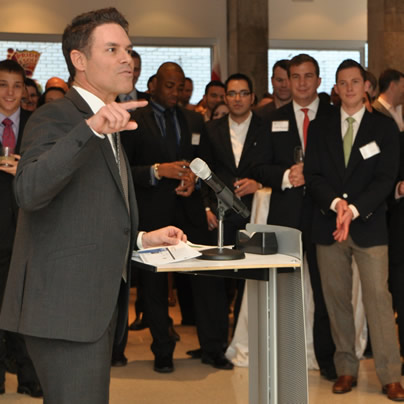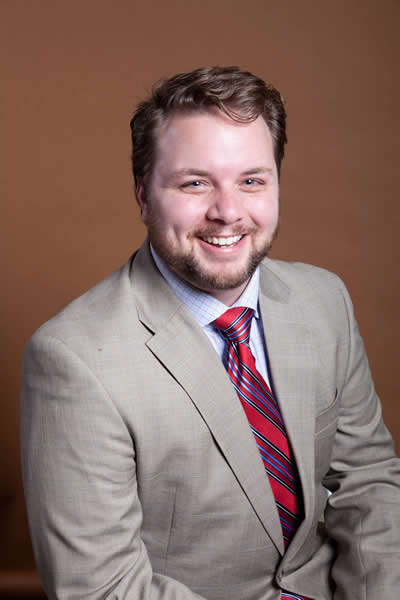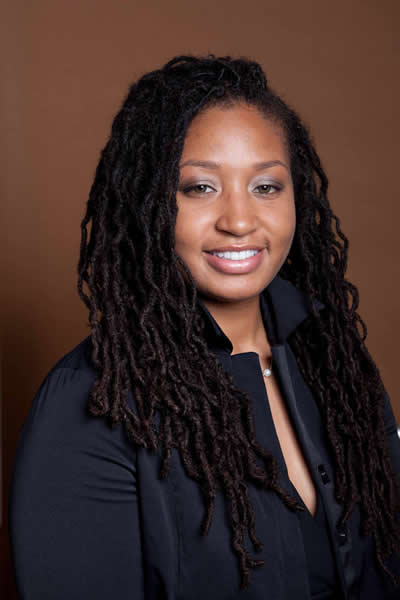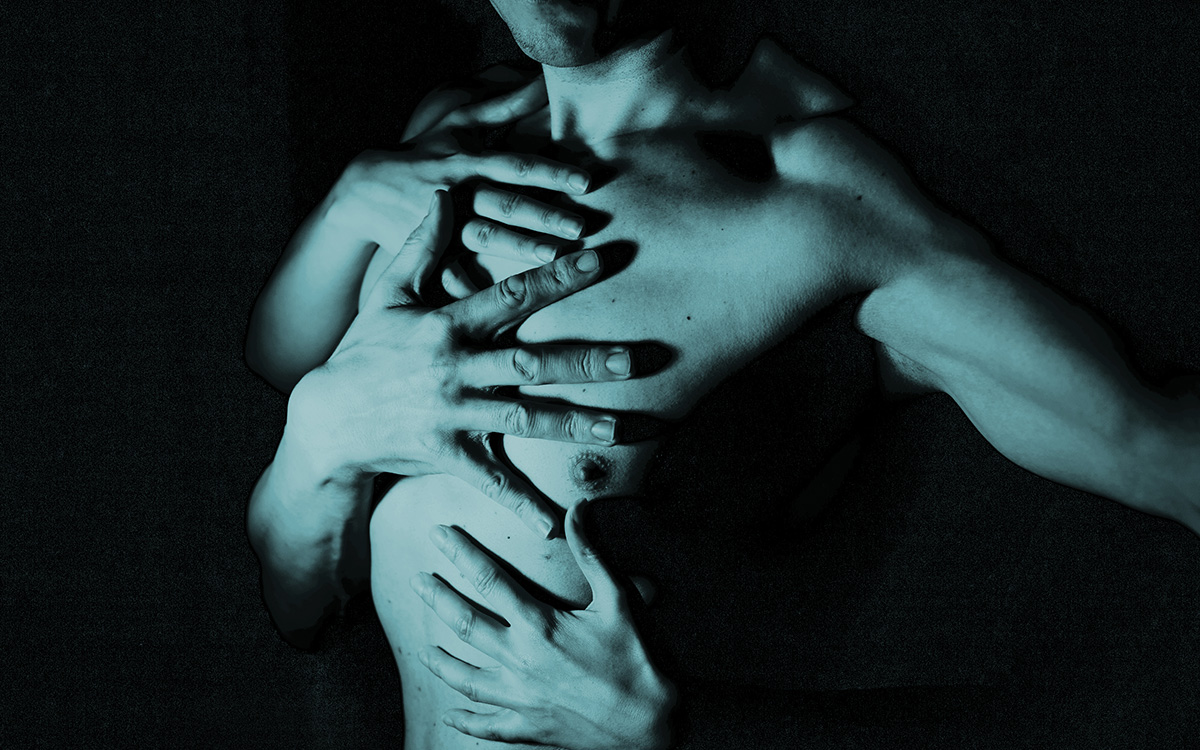Living
A helping hand
This year’s Point Foundation scholarship winners have big dreams


Pete Subkoviak (Photo courtesy of the Point Foundation)
Pete Subkoviak, from Madison, Wis., entered the world female, but never identified as anything other than male. From the age of 3, he insisted he was male. With the support of family and friends, Subkoviak began to transition, gained a second chance at life, and went after it with passion.
As an undergraduate student at the University of Wisconsin, Subkoviak spoke often about the transgender community. He interned for Sen. Russ Feingold (D-Wis.) and pursued a career working on state and federal HIV policy for the AIDS Foundation of Chicago.
Subkoviak is among 76 LGBT students awarded scholarships this year by the Point Foundation, a national group that raises money to fund scholarships for LGBT students in need due to unsupportive families. The Point Foundation began offering scholarships in 2001 and has supported hundreds of students, with 145 alumni already earning their higher education degrees. Many have gone on to pursue their life goals, including becoming doctors, lawyers and filmmakers. Alex Morse, the country’s youngest openly gay mayor, was a Point scholar.
Subkoviak used his Point scholarship for graduate school and plans to matriculate from Johns Hopkins this month and work on health care reform implementation and other policies that will expand access to health insurance.
“The Point Foundation is not just a scholarship program, but has also given me the professional guidance and emotional inspiration I need in order to achieve my academic and post-graduate aspirations,” Subkoviak says. “I really feel driven forward by the fellow scholars, the organization and all of its supporters.”
While the financial assistance that Point offers has helped him a great deal, it’s the networking and growth opportunities that have played just as important a role in his success. Each year, Point holds a leadership conference where all the scholars, alumni, staff and boards get together to share experiences, support each other and build skills.
“Last year we held the event right here in Washington D.C., and we were able to speak with successful LGBT individuals from all walks of life to hear their stories and get advice on how we might follow their path,” Subkoviak says. “The foundation has seen some tremendous growth over the past few years to the point where they can now support 76 scholars. But the need out there is huge so I hope that people continue to jump on the Point bandwagon and they can extend the opportunity to many more LGBT youth.”
One of the most important moments of his time as a Point scholar happened just a few weeks ago when Subkoviak had the opportunity to meet Tyler Clementi’s father and brother and spoke with them about the importance of their work to support LGBT youth. Clementi is the gay Rutgers University student who committed suicide after being secretly recorded during a date with another man by his roommate.
“School can be tough for anyone, but LGBT students can feel especially alone. Point really understands the need for LGBT students to have visible, overt support, and they really work to makes you feel like you have a large community right there with you, rooting for you all the way,” he says. “A few years ago, Point and the Tyler Clementi Foundation joined together to offer a scholarship in Tyler’s name—one dedicated to ending the bullying and isolation of LGBT youth in educational settings.”
With a background and interest in public policy and politics, Subkoviak is working on an innovative transgender employment program.
“As a transgender man myself, I became distressed that very few organizations were serving the community, much less appreciating the discrimination in education and employment that forces many transgender individuals into the street-based sex work and HIV risk behavior,” he says. “In 2010, I drew up the blueprint for a transgender employment program and found a partner in Chicago House and Social Service Agency. Together we built a large coalition of government officials, community leaders and transgender individuals in order to make it a reality.”
Then something interesting happened: public and foundational support for the program exploded, and the scale of the project transformed in breathtaking fashion. It’s taken some time, but this July the final product, called the TransLife Center, will be fully realized.
It will offer TransHousing, beginning with more than 30 units of housing to those who are trans and living on the streets. It will also offer TransWorks, a full-scale employment program, TransHealth with medical connections to care services, TransLegal services and TransSafe, a drop-in center where transgender individuals can get off the street to get a shower, a meal and relax in an environment that is free from discrimination.
“I think that as LGBT organizations continue to acknowledge the need to more fully integrate the ‘T’ into their work that the TransLife Center is going to offer incredibly important lessons and be looked at as a trailblazing program,” he says. “Over the long term I’m interested in authoring a book on domestic policy. I’d also like to join a rock ‘n’ roll band and run for public office—hoping that the two aren’t mutually exclusive.”
Another Point scholar is Monica Motley, a dual degree student at Virginia Tech seeking a doctorate degree in philosophy in the Department of Biomedical and Veterinary Sciences and a master’s of public health degree in the Department of Population Health Sciences.

Monica Motley (Photo courtesy Point Foundation)
“When I think about the Point Foundation, it’s really meant to me guidance, support and opportunity,” she says. “I can be exactly who I am unapologetically, but also at the same time, better ensuring that I can achieve my potential for greatness to change the world.”
In 2007, Motley was elected the first African-American homecoming queen in 35 years, as well as the first openly gay homecoming queen at Virginia Commonwealth University.
A Danville, Va., native, Motley, who came out at 16, plans to become a social scientist and public health practitioner seeking to better understand how various socioeconomic factors influence health behaviors and outcomes in high risk populations, such as the LGBT community.
“My research aims to identify and better understand different social factors—physical environment, education, income — influence our health behaviors, especially physical activity and nutrition,” she says. “I look at that in high-risk communities, communities of color, LGBTQ, individual of over 45, low-income.”
Not only does she work on the research itself, but she tries to figure out how to recruit more diverse individuals into research so that it can better prepare those as catalysts for change.
“One of the most valuable things I have taken away from Point is mentorship from people who look like me,” she says. “Not necessarily in the literal sense, but being from a small city, an African American, a woman and an out lesbian, it was really important that I was connected personally and professionally that I was connected to people who were also gay. It has helped me become more confident.”
Point Foundation’s academic/program year begins in July with a leadership conference, where past and recently awarded scholars receive intensive training in leadership development, accountability, community service guidance, and advocacy and philanthropy to the LGBT community.
“When I look at my fellow scholars, these are brilliant individuals. There’s someone who has discovered a planet. There’s someone who has won an award for documentaries. For someone to say that they need me to succeed so we can all continue this movement to achieve equality, it moves me and gets me so emotional,” Motley says. “Think of how much further along we would be if we had more people tell the generations that are our future that we are underestimating our ability for equality. That’s what the Point Foundation did for me. It’s been life changing for me.”
Real Estate
Spring updates to sell your home for pride and profit
Consider new landscaping, power washing, creative staging

Selling a home is a big deal for anyone, but for members of the LGBTQ+ community, it comes with unique considerations—from finding affirming professionals to ensuring your home is represented in a way that reflects your values. Whether you’re a first-time gay home seller or a seasoned LGBTQ+ homeowner looking to move up, maximizing your home’s value is key to a successful and empowering sale.
Here’s how to prepare your home, your mindset, and your real estate strategy to get the most value—financially and emotionally—from your home sale.
1. Start with an LGBTQ+-Friendly Real Estate Agent
Before diving into renovations or staging, make sure your agent truly understands your needs. A gay-friendly or LGBTQ+-affirming real estate agent brings more than just market expertise—they bring cultural competence, safety awareness, and a network that supports you throughout the selling process.
At GayRealEstate.com, you can find experienced, vetted LGBTQ+ real estate agents who have been proudly serving the community for over 30 years. Working with someone who shares or supports your identity ensures your selling journey is respectful, inclusive, and effective.
2. Enhance Curb Appeal—With a Welcoming Vibe
The outside of your home is the first impression a potential buyer gets. Make it count—especially for LGBTQ+ buyers looking for a home that feels safe and welcoming.
- Fresh landscaping: Add colorful flowers, neatly trimmed shrubs, or low-maintenance greenery to appeal to eco-conscious buyers.
- Update the entrance: A new front door, stylish lighting, or even a rainbow doormat can make your home feel like a safe space from the start.
- Clean and repair: Power wash the exterior, touch up paint, and make any necessary repairs to gutters, windows, or siding.
3. Stage with Intention and Inclusivity
Home staging can add thousands to your sale price. But beyond the usual decluttering and neutral palettes, think about how your space tells a story—and who it’s telling it to.
- Create a warm, inclusive feel: Subtle touches like LGBTQ+ art, books, or even coffee table magazines can show off your personality and affirm the space for queer buyers.
- Depersonalize—but don’t erase: You don’t need to hide your identity to appeal to buyers. Let your home feel lived in and loved—while still being a blank canvas others can imagine themselves in.
- Highlight multi-use areas: Home offices, gender-neutral nurseries, or flex spaces resonate with LGBTQ+ families and professionals.
4. Update Kitchens and Bathrooms Strategically
These rooms matter most to buyers—and even small updates can yield big returns.
- Kitchen: New cabinet hardware, a fresh backsplash, and modern lighting can elevate the entire room without a full remodel.
- Bathroom: Replace old fixtures, re-caulk tubs and sinks, and add plush towels and inclusive décor.
- Energy-efficient upgrades: Touchless faucets, smart appliances, or low-flow toilets are not only trendy—they signal sustainability, which matters to LGBTQ+ buyers.
5. Make Your Home More Energy Efficient
LGBTQ+ homebuyers often prioritize sustainability. These updates not only reduce energy bills but make your home more marketable.
- Install a smart thermostat (like Nest or Ecobee)
- Upgrade insulation or windows
- Consider solar panels (especially in sun-drenched regions like California or Florida)
Bonus: You may qualify for state or federal tax credits, which can be a great selling point.
6. Know and Advocate for LGBTQ+ Housing Rights
Although housing discrimination is illegal under the Fair Housing Act, it still happens. As an LGBTQ+ seller, be aware of your rights—and those of potential buyers.
- Avoid steering or bias: Even with good intentions, make sure you’re not inadvertently influencing who views or buys your home based on identity.
- Work with affirming professionals: From inspectors to lenders, choose partners who support inclusive practices.
- Report discrimination: If you or a buyer encounters bias, report it to HUD or your local housing authority.
7. Price Your Home Right—and Market It Smartly
Setting the right price is essential to maximizing value. Your LGBTQ+-friendly agent can run a comparative market analysis, considering current trends and buyer demographics.
- Leverage LGBTQ+ real estate networks: Promote your home through platforms like GayRealEstate.com to reach an audience that understands and values your space.
- Use inclusive language in listings: Avoid gendered terms or heteronormative assumptions. Instead of “his and hers closets,” use “dual walk-ins” or “double closets.”
- High-quality photos and video tours: Showcase your home with professional, visually inclusive marketing that appeals to diverse buyers.
8. Consider Timing and Local LGBTQ+ Trends
Selling during WorldPride or just before local LGBTQ+ events may boost visibility. Also consider if you’re in or near an LGBTQ+ friendly city or neighborhood.
Not sure which areas are top destinations? GayRelocation.com tracks and shares the best cities for LGBTQ+ homebuyers, helping you tap into motivated buyers.
Final Thought: Sell with Confidence—and Community
Selling your home isn’t just about getting top dollar—it’s about closing a chapter with pride and integrity. When you center your values, work with LGBTQ+ affirming experts, and prepare your home with purpose, you’re not just maximizing your home’s value—you’re creating an empowering experience for yourself and the next owner.
Whether you’re buying, selling, or both—GayRealEstate.com is your trusted partner in every step of your journey. With a nationwide network of gay and lesbian realtors, decades of experience, and deep community ties, we ensure your home transition is safe, smart, and full of pride.
GayRealEstate.com is the nation’s leading online platform connecting LGBTQ+ home buyers and sellers with LGBTQ+ friendly real estate agents, ensuring a safe and supportive experience.
Scott Helms is president of GayRealEstate.com. To find an agent or learn more, visit GayRealEstate.com, GayRelocation.com or call 1-888-420-MOVE.
Real Estate
Navigating DMV real estate market during political unrest
Reductions in federal employment have introduced uncertainties

The Washington, D.C.-Maryland-Virginia (DMV) region has long been recognized for its robust housing market, underpinned by the presence of the federal government and a diverse economic landscape. Recent massive reductions in federal employment have introduced uncertainties, yet the area continues to offer compelling reasons for prospective homebuyers, particularly within diverse communities.
While the federal government has traditionally been a significant employer in the DMV, the region has proactively diversified its economic base. Sectors such as technology, professional services, education, and healthcare have expanded, mitigating the impact of federal job cuts. This diversification fosters some economic resilience, which offers our area a semblance of protection against the impending unknowns that we currently face. Nothing can shield real estate entirely; however, our area tends to survive these types of changes better than other parts of the country.
Despite concerns over federal layoffs, the DMV housing market has demonstrated notable stability. Analyses indicate that the number of active listings, sold properties, and median sales prices have remained steady on a year-over-year basis. This steadiness suggests that the market is adapting to changes without significant disruption.
Furthermore, while there has been a slight increase in home listings, this trend aligns with typical seasonal variations and does not solely reflect federal employment changes. The luxury property segment, in particular, continues to thrive, indicating sustained interest and investment in the region.
The DMV region is renowned for its cultural and demographic diversity, with areas like Montgomery County, Md., being among the most ethnically diverse in the nation. This inclusivity extends to various communities, including LGBTQ individuals, fostering a welcoming environment that enhances the area’s appeal. Even though the current administration is fostering anti-diversity ideology, I remain confident that our LGBTQ community will continue to thrive even as these destructive forces work against us.
Local governments within the DMV have implemented policies aimed at promoting affordable housing and preventing displacement, particularly in the wake of economic shifts. Initiatives like the Douglass Community Land Trust in Washington, D.C., exemplify efforts to maintain housing affordability and support community stability.
Additionally, jurisdictions such as Montgomery County have longstanding Moderately Priced Dwelling Unit (MPDU) programs that require developers to include affordable housing in new residential developments. These policies contribute to socioeconomically mixed neighborhoods, benefiting diverse populations.
Despite Elon Musk’s brandishing of a chainsaw to the federal workforce, our real estate market continues to thrive. The DMV region maintains its appeal. Economic diversification, market stability, commitment to diversity and inclusion, and progressive housing policies collectively contribute to an environment that supports and attracts diverse communities. Prospective homebuyers can find reassurance in the region’s resilience and ongoing efforts to foster an inclusive and vibrant community. These are only a few among the many reasons to have a positive outlook while considering real estate options in our area.
It is important to consider working with brokerages, brokers, agents, lenders and title companies who align with our community and our objectives. Not all LGBTQ agents work for brokerages that support or understand the needs of the members of our community. Do your research and find out who has donated money to what political causes. Now more than ever we must support members of our community to protect our way of life and our very existence.
Stacey Williams-Zeiger is president/principal broker of Zeiger Realty Inc. Reach her at [email protected].

Hi Michael,
When I came to D.C. for college and came out, I was idealistic about finding true love. I made gay friends at school and watched them hooking up all the time.
It seemed like the opposite of what I wanted. I dreamed of meeting “Prince Charming” and living happily ever after. I thought I would put off sex until I met my special guy.
This went on for a while until I got too horny and impatient to keep putting off sex. The boyfriend wasn’t materializing so I went online and hooked up. Actually it was a lot of fun.
Soon I was hooking up as much as any of my friends were. I kept hoping I’d still find my prince. But over time most of my energy shifted to finding guys to have sex with.
Now I’m 34. I’ve been at this a long time and I realized the other day that I don’t like my life.
I haven’t been on a real date in years but I’m hooking up multiple times a week. I’ve been with almost everyone I see on the apps whom I find attractive (where the feeling was mutual). And yes, I’ve been with a lot whom I didn’t find attractive because I was horny.
I look at myself and I think, yuk. I don’t like whom I’ve become.
I feel like I am addicted to hooking up. I just keep craving something. The release but mostly the attention, that the other person finds me hot. After I come, I feel like the whole thing was pointless, and a little disgusted with myself. Advice?
Michael replies:
You’re using hookups not just for sex, but as a way to feel good about yourself by getting positive attention from others.
But other-validation is like junk food, a sugary snack that staves off hunger for a few minutes and never really fills you up. All those guys you hook up with? The attention feels great, but as you wrote, that feeling lasts until your orgasm. And then you’re back to chasing it.
As with junk food, the other-validation you get when you hook up is a lot of empty calories. Having someone you don’t even know agree to have sex with you says nothing meaningful about your worth or even your attractiveness.
Yet another problem: If you believe that you need other-validation, you will do all sorts of self-damaging behaviors to get it—such as hookups that leave you feeling empty and disgusted. I’ve seen many people lose their self-respect in the service of getting other people’s positive attention through behaviors that violate their own integrity. Doing things that make you feel bad about yourself in an attempt to feel good about yourself is ironic, and sad.
The bottom line is that other people can’t “make” you feel good about yourself. They might give you a small temporary boost, but your self-esteem actually has to come from you. That’s why it’s called self-esteem. Once you are past a certain age, if you don’t believe that you have value, no one else can get you there. You have to validate yourself.
Let’s go big-picture for a moment: It is our parents’ job to teach us that we have value when we are little, and when that doesn’t happen, we often struggle with self-esteem throughout our lives, unless we can find a path to develop our own belief in our worth. In the meantime, we may chase other-validation in a futile attempt to fill ourselves up.
Other experiences we go through—for example, growing up gay in a hostile environment—can also do a number on how we see ourselves, and leave us grasping for affirmation from others. It takes work to get through and get past the impact of these experiences.
So how do you get better at giving yourself the validation you are seeking? There’s a great saying from the 12-step programs: If you want to have self-esteem, behave in esteemable ways.
What would it mean for you to behave in a way that you respect? Your letter provides one answer that is true for you: Stop engaging in sexual encounters that leave you disliking yourself.
Far easier said than done, right? But that doesn’t mean it’s impossible. Having gotten clarity that you don’t like the life you’ve constructed for yourself, now you actually can do something about it. Keep in mind, though, that you will face some challenges if you stop hooking up.
First: You may find it isolating and scary to stop doing something that all or most of your friends are doing. You will have to reassure yourself that you’re doing what’s right for you; that you are taking good care of yourself by choosing to avoid behaviors that leave you feeling bad; and that it’s OK to be different from “everyone else.” In other words, you are going to have to get much better at self-validation.
If you have some friends who don’t spend a lot of their time hooking up, they may be good supports for you. Some guys find camaraderie from attending a 12-step program like Sexual Compulsives Anonymous (SCA).
Second: People often use hookups (and sex) not just for sexual gratification, but to soothe anxiety, stress, depression, and other uncomfortable feelings. If you stop hooking up, you will likely need some other ways to keep yourself calm and to steady your mood. Exercise and meditation are two obvious means.
You’d be wise to figure out new ways to fill your time that give you a sense of meaning and connection. I can’t tell you what those might be; only you can figure out what is right for you. They might include developing or deepening warm friendships, taking good care of yourself, finding a new activity that interests you — the list can go on and on.
If you still want to find your prince, this is the way to go about it. The cliché is true: You can’t expect anyone to like you unless you like yourself. If you build a life rich in fulfilling pursuits that help you to feel good about who you are and the life you are leading, you will be transforming yourself into relationship material.
Keep in mind, though, that letting yourself get close to someone through a heart connection would mean having to confront all sorts of uncomfortable emotions, including feeling vulnerable, that you have avoided by limiting yourself to crotch attachments.
That said, working to become a more solid person would help you develop the strength to tolerate the ongoing challenges of a close relationship.
Michael Radkowsky, Psy.D. is a licensed psychologist who works with couples and individuals in D.C. He can be found online at michaelradkowsky.com. All identifying information has been changed for reasons of confidentiality. Have a question? Send it to [email protected].
-

 El Salvador4 days ago
El Salvador4 days agoGay Venezuelan makeup artist remains in El Salvador mega prison
-

 State Department3 days ago
State Department3 days agoHIV/AIDS activists protest at State Department, demand full PEPFAR funding restoration
-

 Brazil3 days ago
Brazil3 days agoUS lists transgender Brazilian congresswoman’s gender as ‘male’ on visa
-

 District of Columbia4 days ago
District of Columbia4 days agoTwo charged with assaulting, robbing gay man at D.C. CVS store










